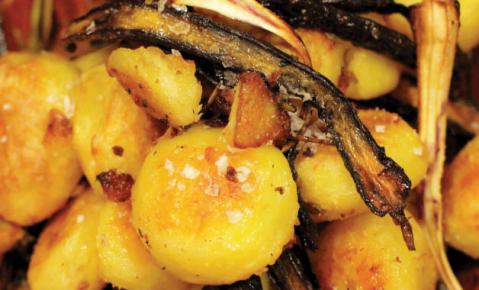 The only way to save local fishing industry jobs is to stop eating fish – unless you can be sure it's been caught by British fishermen using sustainable methods, argues a report published today by Sustain: the alliance for better food and farming(1). The report “Like shooting fish in a barrel(2)” coincides with the annual London Oyster and Seafood Fair(3).
The only way to save local fishing industry jobs is to stop eating fish – unless you can be sure it's been caught by British fishermen using sustainable methods, argues a report published today by Sustain: the alliance for better food and farming(1). The report “Like shooting fish in a barrel(2)” coincides with the annual London Oyster and Seafood Fair(3). Sustain's report outlines the health pros and cons of eating fish, summarises the environmental damage caused by both industrial fishing and fish farming, and lays bare the contradictions in government policy at both UK and EU level.
“Government policy is all at sea”, commented author Ben Wielgosz. “One government Agency is telling people to eat more fish, because it's good for their health(4). The same Agency is issuing health warnings, because some fish are too contaminated for pregnant women to eat(5). At European level, the EU knows that the North Sea fisheries - and others - are on the brink of collapse, but doesn't have will to put the public interest first, behind vested interests. We are looking to Blair's EU Presidency to tackle the Common Fisheries Policy that pretends to conserve endangered fish stocks, while subsidising super-trawlers that wreak environmental havoc(6).”
The report concludes with a unique consumer fish guide, based on seven authoritative sources(7) so that consumers don't have to choose between fish that is healthy OR sustainable (or neither), but can choose both. Unfortunately, many fish and seafood choices are off the menu, as stocks are dangerously low, are caught unsustainably, and/or are contaminated(8).
“Unless people change what they eat, and governments stop running scared of vested interests, we're simply going to run out of fish”, noted Sustain's Co-ordinator Jeanette Longfield. “If that happens, local sustainable fishing industries – some of which are being celebrated at the Oyster and Seafood Fair, will simply be wiped out – and that would be a tragedy both for people and the environment.”
- ENDS -
CONTACT
Ben Wielgosz on 0796-356-8276
Jeanette Longfield on 0203 5596 777
NOTES TO EDITORS
1) Sustain: The alliance for better food and farming advocates food and agriculture policies and practices that enhance the health and welfare of people and animals, improve the working and living environment, enrich society and culture and promote equity. We represent over 100 national public interest organisations working at international, national, regional and local level.
2) Like shooting fish in a barrel: The collapse of world fisheries in the 21st century and what we can do to prevent it from happening. Researched and written by Benjamin Wielgosz and edited by Jeanette Longfield.
3) The annual Hay's Galleria Oyster & Seafood Fair – London's festival of fish – will be taking place from 9-11 September. This three-day event includes demonstrations by experts from the National Federation of Fishmongers and Seafish Kitchen, and a range of exhibitors. http://www.haysgalleria.co.uk/Hays/HaysGalleria.nsf/events?OpenFrameSet
4) Food Standards Agency - http://www.eatwell.gov.uk/healthydiet/nutritionessentials/fishandshellfish/
5) Food Standards Agency Committee on Toxicity – Scientific Advisory Committee on Nutrition, “Advice on Fish Consumption: Benefits and Risks”. Annex 3:Updated COT Statement on Mercury in Fish and Shellfish, pp120-135. 2004
6) “Super Trawlers: Misplaced Machismo” a researched personal opinion by Brian O'Riordan, Secretary of the International Collective in Support of Fish Workers, Brussels Office, August 2001.
7)
• Environmental Defence's Oceans-Alive online consumption advisory guide to seafood, available online at http://www.oceansalive.org/eat.cfm?subnav=healthalerts
• The Australian Marine Conservation Society's Sustainable Seafood Guide, available online at the following address: http://www.amcs.org.au/campaigns/sustainable_seafood_guide/sustainable_seafood_guide.html
• The Marine Conservations Society's (UK) “Good Fish Guide” (2002), available for purchase online at http://www.fishonline.org/
• The UK Food Standard Agency's “Your Guide to Oily Fish” of June 2004, available online at http://www.food.gov.uk/news/newsarchive/2004/jun/fishportionslifestagechart
• The Royal Society of Chemistry, 'Fatty Acids: Supplement to McCance & Widdowson's The Composition of Foods, 7th Supplement to the 5th Edition'. Compiled by the Ministry of Agriculture Fisheries and Food, 1998.
• The Blue Ocean Institute's 'Sea to Table' programme, “Guide to Ocean Friendly Seafood” available online at http://www.blueocean.org
• The Monterey Bay Aquarium's Seafood Watch, available online at http://mbayaq.org/cr/seafoodwatch.asp
8) See the guide to healthy and sustainable fish on pages 18 and 19 of Like shooting fish in a barrel (1834Kb PDF) from https://www.sustainweb.org/pubslist.php
Food Facts: A series of short reports on over a dozen different products, shows how people's shopping choices - as well as government policy - can protect the environment, enhance social justice and improve health.

